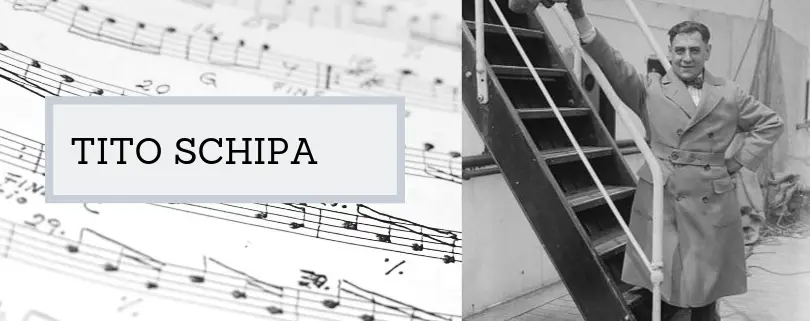The online opera guide on Tito Schipa
Read the short biography of Tito Schipa and listen to highlights of his career. Tito Schipa was one of the great tenors of the golden age.
The ascent
Tito Schipa was born in 1888 in Lecce. Not much is known about his family, it is said that it was the bishop of Lecce who discovered him. His debut took place in 1910 with La traviata and his first appearance in the Scala took place in 1915. In 1917 he sang in the world premiere of “La rondine” by Giacomo Puccini. He had his greatest success in his younger years at the Teatro Colon in Buenos Aires, Followed many engagements abroad with a heavy emphasis in Chicago. From 1930 he sang again more in Italy especially at the Scala.
His voice
His voice was not the radiant one of a Carusos, it was rather small and cloudy and can better be described with the word sadness. He belonged to the group of “Tenore di Grazia“, whose technique did not focus on the larynx (maximum volume) but on the breath, thus producing a lower airflow, with a higher load-bearing capacity, which in large opera houses such as the Teatro in Colon leads to an astonishing vocal clarity and presence to the very last ranks. With this great technique and an uncanny musicality (he composed an operetta in 1835, which he conducted himself), Schipa was able to convince with a wealth of nuances. Schipa’s voice is particularly beautiful in Massenet’s operas (Werther and Manon)x§
Allor, sta proprio qua?..O natura di grazia piena, (Werther) – Schipa
A collection of duets with Lucrezia Bori or Galli-Curci are highlights of belcantistic singing on record.
E il sol dell’anima (Rigoletto) – Schipa / Galli-Curci
His mature years
During the Second World War he lived mainly in Italy and came to terms with the regime. This exposed him to criticism throughout his life. His last appearances were in 1958, which makes his active career extraordinarily long with almost fifty years of stage presence.
Schipa was a master of Italian and Spanish folk songs for which he remained unattainable in Italy.
Core ‘ngrato (Canzonin napolitani) – Schipa
Er starb 1965 in New York an der Folge einer Diabetes-Erkrankung.
Highlights of Tito Schipa’s recordings
A unique duet are Tito Schipa and Amelita Galli-Curci. Listen to them in «Veranno a te sull’aure» from Lucia di Lammermoor
Verrano a te sull’aure – Galli-Curci/Schipa
No one can bring so much emotion into his voice. Hear Manrico’s last aria from Lucia di Lammermoor.
Tu che a Dio spiegasti l’ali
A duet from La Traviata.
Un di felice, eterea – Schipa/Galli-Curci
And another duet from La Traviata.
Parigi o cara lasceremo – Schipa/Galli-Curci
Des Grieux from Massenet’s Manon was one of his favourite roles. As always, Schipa captivates with his elegant voice, which expresses pain unparallelled by other singer. Listen to a recording from the thirties.
Je suis seul… ah fuyez douce images
In this aria from Elisir d’amore you hear Tito Schipa in a great recording from 1924. No tenor is as expressive as Tito Schipa. The plea of Nemorino is heartwarming without becoming lachrymose. His diminuendo at the end of the aria is simply magic. There is an interesting anecdote to this ability of Schipa. “Schipa is said to have been recommended a special training method: a burning candle in front of the singing mouth must not be blown out all at once, but should extinguish slowly while singing – if Schipa learned his art of diminuendo, then candles should become an essential part of singing lessons in the future” (Fischer).
In the this video you will hear one of the legendary duets by with Amelia Galli-Curci. It is simply wonderful how the two voices fit together and sing the great ritardandi in this piece from Verdi’s Rigoletto.
E il sol dell’anima – Schipa / Galli-Curci
Fischer (“Große Stimmen”) is enthusiastic about Tito Schipa’s interpretation of Ernesto in Don Paquale: “Once you hear Schipa here, you are spoiled for all other Donizetti interpreters once and for all. Even if they bear the most famous names. From his singing comes a magic that cannot be described by clichés like golden voice.
Povero Ernesto … Cerchero lontana terra
We hear another interpretation from the tenorissimo di grazia Tito Schipa of Don Pasquale, whose voice has an unforgettable melancholic charm.
Com’e gentil … tutto è languor
We hear the legendary duet partner Tito Schipa and Amelita Galli-Gurci in a wonderful recording of this duet from Don Pasquale.
Tormami a dir che m’ami – Schipa / Galli-Gurci
In keeping with the characters of the Commedia Dell ‘Arte, Leoncavallo accompanies the serenade of Arlecchino with old forms (minuet, gavotte). A miracle of sound instinct (Kesting) is the “O Colombina” from Pagliacci by Tito Schipa.
O Colombina
Fischer (“Große Stimmen”) is enthusiastic about Tito Schipa’s interpretation of Ernesto from “Don Pasquale”: “Once you hear Schipa here, you are spoiled for all other Donizetti interpreters once and for all. Even if they bear the most famous names. From his singing comes a magic that cannot be described by clichés like golden voice.
Povero Ernesto … Cerchero lontana terra
We hear the legendary duet partner Tito Schipa and Amelita Galli-Gurci in a wonderful recording of this duet again from “Don Pasquale”.
Tormami a dir che m’ami – Schipa / Galli-Gurci
Peter Lutz, opera-inside, the online opera guide on Tito Schipa, Tenor




Leave a Reply
Want to join the discussion?Feel free to contribute!